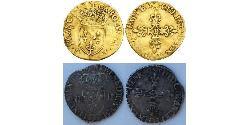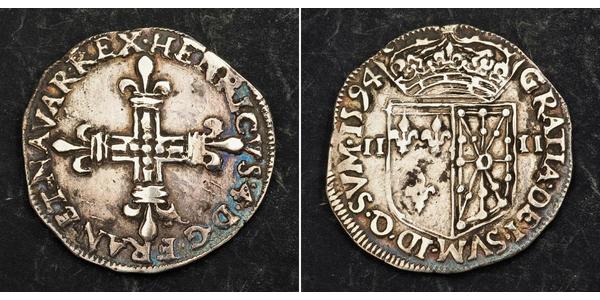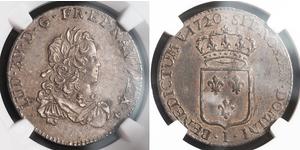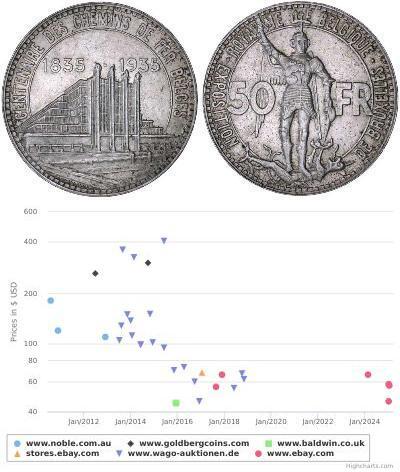1/4 Экю (продана за $83.0)
1594, Royal France, Henry IV. Silver 1/4 Ecu Coin. Saint-Palais (Navarre) mint!
Mint Year: 1594 Mint Place: Saint-Palais Denomination: 1/4 Ecu (quart de ecu) References: Duplessy 1238, Ciani 1519, Sb. 4710. Condition: Cleaned/polished, now retoned, otherwise a nice VF! Diameter: 29mm Weight: 9.55gm Material: Silver
Obverse: Cross with terminated by lis symbols. Legend: HENRICVS. 4. D. G. FRANC. ET. NAVAR. RX.
Reverse: Crowned shield with arms of the Kingdoms of France and Navarre. Fractional value (II-II = 4) at sides. Legend: GRATIA. DEI. SVM. ID. Q. SVM.
Navarre, officially the Chartered Community of Navarre (Spanish: Comunidad Foral de Navarra [komuniˈðað foˈɾal de naˈβara]; Basque: Nafarroako Foru Komunitatea [nafaroako foɾu komunitatea]), is an autonomous community and province in northern Spain, bordering the Basque Autonomous Community, La Rioja, and Aragon in Spain and Nouvelle-Aquitaine in France. The capital city is Pamplona (or Iruñea in Basque).
Henry IV (13 December 1553 – 14 May 1610), Henri-Quatre, was King of Navarre from 1572 to 1610 and King of France from 1589 to 1610. He was the first monarch of the Bourbon branch of the Capetian dynasty in France.
Baptised Catholic, he converted to Protestantism along with his mother Jeanne d'Albret, Queen of Navarre. He inherited the throne of Navarre, in 1572, on the death of his mother. As a Huguenot, Henry was involved in the Wars of Religion, he barely escaped the St. Bartholomew's Day massacre and later led protestant forces against the French Royal Army.
As a prince de sang by his father, Antoine de Bourbon, he was also the natural heir to the throne of France. On the death of the childless Henry III, he ascended the throne of France in 1589, but had to abjure his Calvinist faith. However, his coronation was followed by a four-year war against the Catholic League to establish his legitimacy.
One of the most popular French kings, both during and after his reign, Henry showed great care for the welfare of his subjects and, as a politique, displayed an unusual religious tolerance for the time. He notably enacted the Edict of Nantes, in 1598, which guaranteed religious liberties to the Protestants, thereby effectively ending the civil war. He was assassinated by François Ravaillac, a fanatical Catholic.

spa1 » France - 16th century (12 монет)
What had France in 16th century? Pretty much the same what another European countries had: wars with neighbors, religious conflicts (Catholics vs Protestants), etc. Good things also happened in that century - it was time of 'The Renaissance'. C ...

|
Добавив:
anonymous 2018-06-01 |
|
||
|
||
|
||
|
||
9 описів монет було покращено з 2025-05-28 по 2025-06-04
Одна з них:
1 Гульден Королівство Нідерланди (1815 - ...
в групі 5 монет / 5 цін




 English
English






-300-150-nRgsHgTyozIAAAGW7ltyjN9I.jpg)





